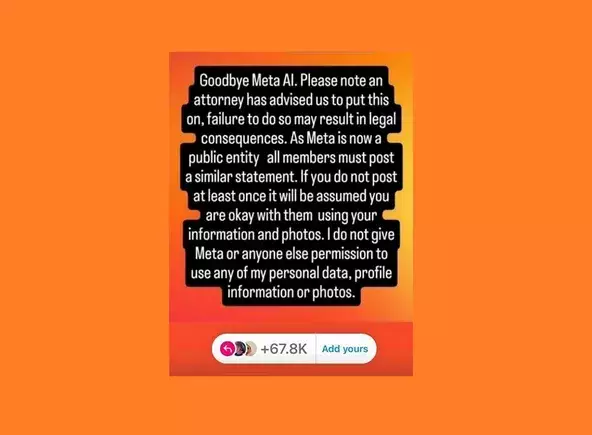In an age dominated by rapid-fire information and the constant buzz of social media, many users often fall prey to simplistic narratives that promise empowerment or protection—even when such promises are hollow. Specifically, the recent trend of individuals claiming legal rights on platforms like Instagram by posting vague messages about their content is an exercise steeped in misunderstanding and misinformation. Let’s dissect the dynamics of this phenomenon and explore the importance of informed engagement in the digital age.
In a world where knowledge is abundantly available at our fingertips, it is perplexing to witness a significant number of social media users invest time in assuming legal stances through fleeting posts rather than taking the time to educate themselves. The devices that facilitate this behavior—smartphones and tablets—also serve as gateways to comprehensive knowledge about legal rights and the implications of social media usage. Despite this vast availability, many users prefer the comfort of oversimplified notions over the effort required for thorough research.
This ironic disconnect is reminiscent of a tired trope from popular culture: a character believing they can declare bankruptcy merely by vocalizing it. The act of posting a legal-sounding statement on social media carries no weight, yet it is embraced as a form of activism. Many lack an understanding of the legal documentation required to initiate actual protection or objections. Instead of yielding the intended results, such posts often reinforce the notion of digital engagement theater—an empty performance meant to signal dissent without substantive action.
The situation becomes even murkier when one considers the evolving policies of companies such as Meta. Users often remain unaware of the intricate agreements they enter into upon signing up for platforms. Meta explicitly declares its intention to utilize publicly shared content to train its AI systems, essentially rendering any efforts to retract that content after the fact ineffective. Users have already granted implicit consent by agreeing to the terms of service, often without scrutinizing the lengthy documentation linked to their accounts.
Importantly, while the European Union offers a “Right to Object,” many other regions do not, leaving users in those areas without formal recourse. This disparity further complicates the misconception surrounding social media posts as valid forms of legal objection. Moreover, when influencers or celebrities amplify these messages, they inadvertently mislead their followers, who may not have the tools or inclination to dissect the underlying misinformation.
So what can users do instead of getting swept up in the currents of social media rhetoric? The answer lies in empowerment through education. Users should proactively seek out genuine resources that demystify legal rights, privacy terms, and data usage policies specific to the applications they engage with. Engaging with informative content—not just relying on tweets or posts—is essential for understanding the complexities surrounding digital privacy and rights.
Instead of sharing unverified legal disclaimers, individuals should take initiative to familiarize themselves with legal precedents that govern the usage of online content. Consulting accurate legal documents, understanding copyright implications, and exploring political discussions regarding social media guidelines in their respective nations can foster a more nuanced perspective.
Moreover, blindly following the lead of social media figures can lead to the dangerous misconception that such narratives hold truth or legal standing. This misunderstanding can turn naïveté into a liability, as those promoting false legal actions might be seen as easy targets for online scams. In an era where misinformation spreads like wildfire, fostering a critical approach to media consumption is more crucial than ever.
As individuals navigate the convoluted landscape of social media law and personal privacy, the call for genuine understanding and informed engagement cannot be overstated. Dismissing the allure of superficial activism in favor of deep learning is essential for redefining power dynamics in the digital age. The ability to discern fact from fiction is a crucial skill, and users would do well to cultivate this skill amidst the cacophony of modern-day social media narratives.


Leave a Reply